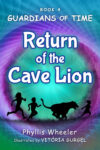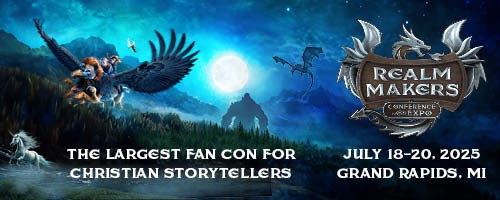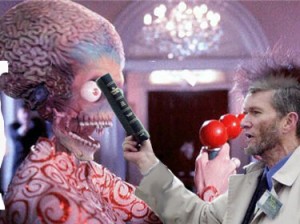Ken Ham, Sci-fi Fan
Regardless of whether you agree with Answers in Genesis, the Biblical-defense ministry that accepts and promotes literal six-day creation and a global flood, one must admit:
- For evangelicals, they do Art right. (Just go to the Creation Museum in northern Kentucky for proof.)
- Their staffers do love practical science — and enjoy science fiction.1
- The organization could make great strides among ChristiaNerds by promoting this Biblical sci-fi love even more.
That last comes after AiG founder Ken Ham’s post on Facebook this morning:
Apparently I could be a movie star fighting Martians. In another childish attempt to mock me and AiG,, James McGrath, Associate Professor in Religion and Philosophy at Butler University in Indiana, posted a doctored photo with me in it.2
Apparently someone obtained a photo from the Mars Attacks movie (the 1996 movie that is a parody on science fiction movies) and replaced an actor’s photo with mine.
I’m just glad he used a photo of me from years ago when I had brown hair! As I tell people, I had to dye my hair gray to let people know I was getting old ☺. Well—at least I still have hair!
There we go; now there’s some swashbuckling.
Though I do like science fiction movies, so in a way I do take this photo as a compliment ☺. But I would have preferred he substitute my photo in one from a Dr. Who or Star Trek episdoe [sic].
Well now! Critics both Christian and pagan like to portray Ham as a constant crusader for fundamentalist notions that will keep driving the kids and the culture away from those homophobic religious rascals, when in fact he enjoys a good Trek or Who story like any fan.3
In response I asked:
Way to come out of the closet, brother! We Whovians and Trekkers who enjoy these for God’s glory now gain an ally.
I’d love to hear more about this.
Classic “Who” and/or contemporary “Who”?
“The Original Series” with its corny classic humanism? “The Next Generation” with its upgraded humanism yet also traces of truth? “Deep Space Nine” with its surprising challenge of Federation humanism (by name!) versus a fictitious Christian-esque religion?
For AiG supporters who lean toward fear about the culture — rather than swashbuckling-in-Christ engagement of it — AiG could only benefit itself, and better, the Kingdom, by revealing in articles and books the Secret of How Ken Ham Just Might Enjoy Science Fiction Such As Star Trek and Doctor Who for God’s Glory.
- For example, this 2007 Answers magazine article by Carl Kerby notes: “God can use fiction—even if it is overtly antibiblical—to bring about good. Whether they realize it or not, writers who are atheists and evolutionists must borrow biblical concepts in order for their stories to make sense. Even the atheist Isaac Asimov often incorporated Christian elements into his stories. … Now that I am a Christian, I look at science fiction through biblical glasses. I can see the evolutionary bias of many science fiction authors. But I can also see Christian themes in many of these same works.” ↩
- Original article: Mars Attacks Young-Earth Creationism, May 14. ↩
- This isn’t entirely new for Ham; previously he’s mentioned enjoying sci-fi films such as Jurassic Park and Avatar. ↩



































And all I can see is the response: “Of course he likes sci-fi, since Young Earth Creationism is nothing but science-ish sounding fiction!”
But at least I can have a faint hope of pretending to fit into polite society. Now I can deflect the conversation to sci-fi instead of starting a fight by saying how much I don’t care about YEC.
Thought about that not long ago, bad_cook.
Wrote this elsewhere:
Instant rebuttal, though: it’s not “creationists” coming up with those sci-fi shows.
…I don’t really see how that rebuttal’s relevant, though, because the mainstream scientists aren’t the ones coming up with the shows, either. I know from experience that you can’t watch “House” with medical professionals without them griping/laughing about the inaccuracies, and you probably can’t watch sci-fi with theoretical physicists without them doing the same thing at the applied-phlebotium near-magic that passes for “science” in the shows that do try to sound smart.
I agree, this is heartening. I deeply support the original premise of the Young Earth Creationist movement — that human science is uncertain by its very nature and definition, and that Christian scientists and educators need not reinterpret the Bible to fit with the “findings” of mainstream scientists. I love the Young Earth movement for standing against the arrogance of humanistic scholasticism — the attitude that naively assumes that the consensus of academic orthodoxy defines the truth.
As much as I want to like and support it, the Young Earth movement lost me because, in my opinion, it has fallen to the same arrogance that it originally stood against. I don’t like the sense of absolute certainty about the age of the Earth or the timing of the days of the creation week. Even more than that, I detest how Creationists seem to make evolution out to be the biggest evil in the universe. Some Creationist literature that I’ve read (in a magazine years ago, I forget the title or the author) even suggested that the acceptance of evolution is how true Christians can tell the apostate churches from the true churches in these end times, when the prophecy of the apostasy is being fulfilled. I now understand that mainstream Creationism does not go that far; Ken Ham has admitted that believing evolution does not disqualify a Christian from salvation. However, I do feel that the movement still promotes the implication that Creationist Evangelical churches and pastors are better than non-Creationist Evangelical churches and pastors, that not accepting the Creationist position is a serious heresy. They’re doing roughly the same thing that the mainstream evolutionists have been doing for many decades. They’re taking their scientific (and theological) consensus among the members of their own group and trying to enforce that consensus on the greater community as absolute, unquestionable truth.
So, I’m thrilled to hear that Creationist leaders have more than one tune to play. I want to see the Young Earth movement support the wonder of God that many people observe in the study of science, rather than fostering the endless debate and controversy. (Let’s face it, the mainstream culture is never going to accept 6-8 thousand years for the age of the earth; Young Earth scientists should stop trying to “convert” people to something that is clearly not the core of the Gospel and simply enjoy researching what they believe to be truth, for God’s glory.) More than that, I want to see Creationists promote intellectual honesty to the deepest extent. The result can only help foster artistic honesty as well, and then Christian artists and scientists can rejoice together, no matter how old they think the planet is.
Yes, exactly yes!!!!
I hate seeing the age of the earth used to divide Christians among each other. While I personally believe in a young earth, I see know problem with Christians who believe that God used slow evolution in creation. While an interesting debate, it should not be used to measure salvation.
In fact, a close friend of mine, who is obtaining her masters in biology, admitted to me that she believes in an old earth, but that feels both sides of the argument should be considered. That is what the academic community needs — open discussion, not either side insisting that they and they alone hold the truth. We do not know, and it was not given to us to know.
I’d like to know classic vs new who myself.
I have to disagree with the article. It’s cool that Ham has a sense of humor about being made fun of, but I feel like if he were to further divulge how his love for SF is God-glorifying then he’d be more of sociologist than scientist, as his message would be more about persuasion than presentation of data. He’d be more of a preacher and less of a professor if you will.
Regarding young and old earth arguments, the Biblical crux of the issue is that death and decay are the results of sin, which makes a pre-Adamic fossil record incohesive with the gospel. Though I don’t think that philosophically disproves the age of the universe. Regardless, I enjoyed the post.